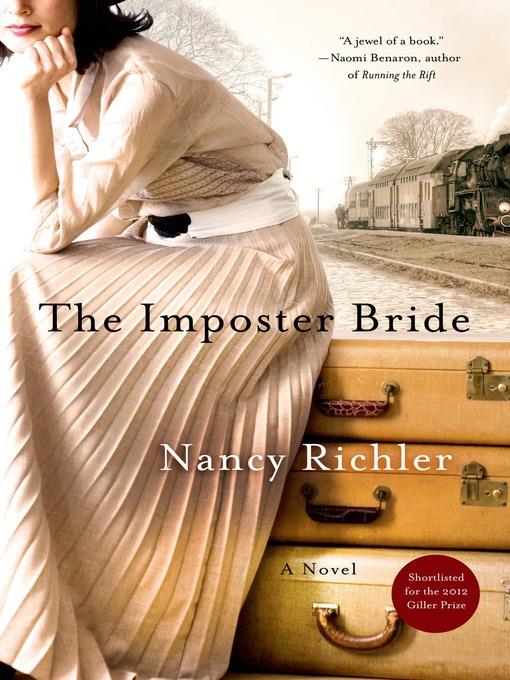
The Imposter Bride
کتاب های مرتبط
- اطلاعات
- نقد و بررسی
- دیدگاه کاربران
نقد و بررسی

December 10, 2012
Richler’s third novel explores emotional devastation that lasts generations, delivering a powerful punch. In post-WWII Montreal, Canada, Lily Kramer, a young refugee, marries Nathan, the brother of the man with whom she had corresponded and who, after catching his first glimpse of his bride-to-be, refused to marry her. But Lily is no saint herself, and not who she portrays herself to be. Told in alternating chapters, Lily’s life after marrying Nathan is juxtaposed with the life of her daughter, Ruth, abandoned soon after she was born. Two notebooks and a mysterious diamond are all that remain for Ruth of her mother, along with a need to know the truth (“Could a person really lose her very sense of self because the world that formed and reflected that self back to her was destroyed?”). Richler—whose previous novel, Your Mouth Is Lovely, won the 2003 Canadian Jewish Book Award—perfectly captures Lily’s heartbreak and the secrets that she keeps. Chapter by chapter the wrenching secrets of the Kramer family peel away, until finally what Lily has hidden is revealed. Once the truth comes, it is heartbreaking. Agent: Dean Cooke, the Cooke Agency.

November 1, 2012
Richler's glimpse into the complicated lives of members of a Canadian Jewish family following the end of World War II provides a retrospective of a bygone culture forever colored by a mystery that shapes the future of a young girl. Lily Azerov Kramer came to Canada to marry Sol Kramer but ended up with his brother, Nathan, after Sol refused to go through with the nuptials. At the wedding, Sol meets Elka, the daughter of a woman who claims to have a cousin with the same name as Lily. As it turns out, Elka's mother is right to be suspicious of Lily, since the new bride has appropriated the identity of a dead woman, along with her diary and an uncut gemstone she carried. Years later, Sol and Elka are married, and Lily has run off and left Nathan to raise their little girl. Ruth, who does not remember her mother and has no sense of who she really might be, studies Yiddish at school and makes friends with neighborhood children but finds herself longing for a connection to her mother. That connection grows out of an unexpected place; one day Ruth receives a package that contains a cryptic note and a rock. That rock is followed by others and leads Ruth to more closely examine the relationship she has with her own identity. Taking down the diary Lily has left behind, she begins to read it, thinking she is on track to find her mother, but she's really reading the words of the dead Lily, who is as much of a stranger to her as her own mother. Richler infuses her work with iconic images from the era she covers, painting a rich image of the Canadian Jewish community, their customs and family relationships, in a past century. Strong imagery and interesting characters populate the novel, but the story slips when it moves to Lily's point of view. A beautiful tale that weakens when it returns to Lily's life and the words of the woman whose identity she has assumed.
COPYRIGHT(2012) Kirkus Reviews, ALL RIGHTS RESERVED.

November 1, 2012
It is 1946, and Lily Azerov has arrived in Montreal to marry Sol Kaplan. Introduced through an Israeli matchmaker, the two have never met, which is evident from Sol's response to his bride-to-be: he refuses to marry her. But Sol's brother, Nathan, has no such reservations. Ida Pearl Krakauer "crashes" the wedding with her daughter, Elka, and knows that the bride is not Lily Azerov, Ida Pearl's long-lost cousin. Yet Ida Pearl says nothing, and so this novel moves from present to past to future and back again as "Lily's" history is revealed and her life conjectured upon by her daughter, Ruth, who fantasizes about the mother who left her behind as an infant. Then with the receipt of a gift from Lily on Ruth's sixth birthday, Ruth begins her own journey to the woman she will become. VERDICT Richler (Your Mouth Is Lovely) illuminates through her introspective and incisive writing the postwar Canadian Jewish community and how the ties with those loved and lost in Europe are never broken, and how the past never relinquishes its hold on us. Says Ruth, "I was very curious [about my mother]. But...the pickings on that front were decidedly slim. I was famished." Readers will enjoy feasting upon this compelling work. [See Prepub Alert, 8/16/12.]--Bette-Lee Fox, Library Journal
Copyright 2012 Library Journal, LLC Used with permission.

























دیدگاه کاربران